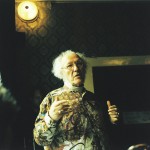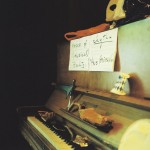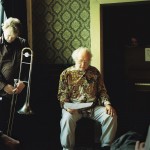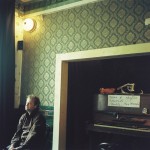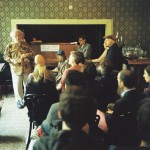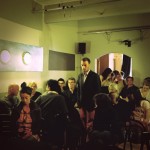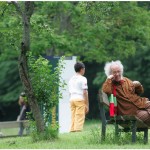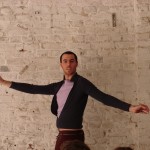SCROLL DOWN FOR ARTIST BIOS
With accompaniment from Phoebe Neville, Hilary Jeffery, Nikolaus Gerszewski, Chris Heenan, Christopher Williams and a few brave audience members, the legendary Philip Corner kicked off a handsome spring evening with performances of “A Revelation of the Instrument’s Reality” (with hand-collected artifacts from Grunewald), “gamelan MU”, and “One Note More Than Once”. His thoughts on empowering the performer were met with both intrigue and resistance from the public.
Diego Chamy surprised us, as usual, with a lecture detailing his drift away experimental music. This was “interrupted” by recordings of him singing better- and lesser-known pop songs in an intimate, sloppy and blissfully unaware style, which continued into the question and answer session.
Photos by Conor Clarke
Trotz der 42 Jahre Altersunterschied zwischen dem Argentinier Diego Chamy und dem US-Amerikaner Philip Corner teilen die Künstler eine kritische Haltung gegenüber der Struktur zeitgenössischer Kultur, die stets das Zentrum ihrer musikalischen Aktivitäten bildet – wie auch eine ganze Menge Humor. Wir möchten sie fragen: Wie hat sich die Gewichtung auf Konzeptualismus auf ihre künstlerische Praxis ausgewirkt?
Diego Chamy and Philip Corner, despite the 42-year age difference between them, have put critical attitudes toward the structure of contemporary culture – and humor – at the center of their musical outputs. How has their emphasis on conceptualism shaped their practices?
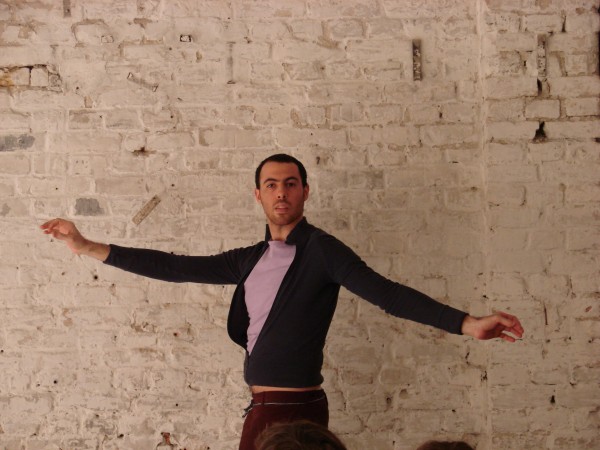
Diego Chamy (Berlin)
Diego Chamy was born in 1975 in Buenos Aires, where he studied music and philosophy. Until 2004, he worked as percussionist, focusing on improvised and contemporary music in general. In 2005, concerned about contemporary music’s difficulties in reaching a non-specialized audience, his work started to change. He progressively stopped playing music and started to dance and work in performance and video-art, having no education whatsoever in these fields and taking this anti-knowledge as material for his pieces. He managed to develop his own style, which is characterized by the use of things that are taken out of context, recurrent confusion and hesitations, plain stupidity, free love, unexpected interruptions and idiotic repetitions. Over the last years he has developed conceptual works, performed street actions, interventions, worked as a theater and film scriptwriter, wrote articles about art and philosophy for different publications around the world, and used any means he had at hand in order to develop and express his ideas. In his works, he tries to address a non-specialized audience, often raising questions regarding the value and sense of contemporary art. Since 2001, Diego Chamy visits Berlin on a regular basis and around 2007 the city became one of his places of residence.
http://www.diegochamy.blogspot.com
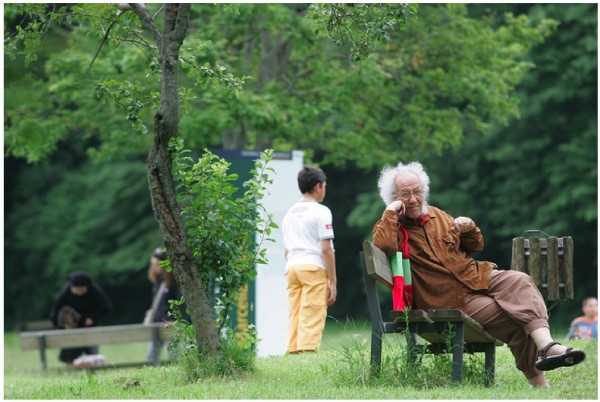
Philip Corner (Reggio Emilia)
Philip Corner (born in 1933, Bronx, New York) is an American composer, now resident in Italy, of interdisciplinary works that have been performed throughout the world; he is also active as a performer, visual artist, and writer. Corner studied composition with Mark Brunswick and musicianship and piano with Fritz Jahoda at the City College of New York, where he earned his BA in 1955, and composition with Henry Cowell and Otto Luening at Columbia University, where he earned his MA in 1959. He also studied analysis with Olivier Messiaen at the Conservatoire National Supérieur de Musique de Paris from 1955 to 1957, where he earned a deuxième prix, and studied piano privately with Dorothy Taubman in New York from 1961 to 1975. As a performer of new music, he has been active as a pianist, trombonist and vocalist and has also played Alphorn and various natural objects, including resonant metals. He served as a resident composer and musician to the Judson Dance Theatre in New York from 1962 to 1964. With Malcolm Goldstein and James Tenney, he co-founded the Tone Roads Chamber Ensemble in 1963, a new music group that performed until 1970.




